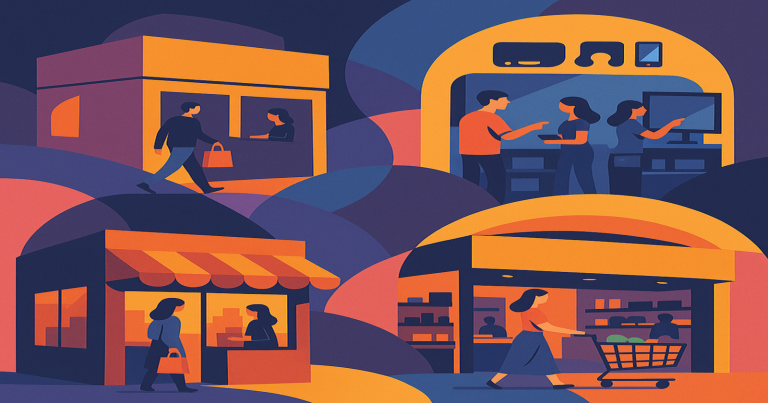Retailers are part of the distribution channel linking manufacturers to end consumers. In the fast-paced world we live in today, consumers have access to goods and services through various means, ranging from supermarkets to online stores. Business students/entrepreneurs/ consumers must understand what retailers mean, what types exist, their functions, and their importance. Hence, this retailing guide will take you through the various formats, discuss their characteristics, and elaborate on their role in the economy and consumer satisfaction. Retailers are not that remote; they are central to your buying experience, from shopping online to stepping into a nearby department store.
Definition of a Retailer
Retailer means any person or entity that sells goods or services directly to the ultimate buyer. Retailers operate at the last stage of a supply chain and sell goods that are wanted for personal consumption. Retailers could, therefore, have a physical store, website, mobile application, or a hybrid of online and offline retailing.
Retailers facilitate shopping by curating assorted products for customers, arranging stipulated promotional offers, providing for service delivery, and ensuring accessibility. These activities are but a small range of the functions performed by retailers. Large quantities of work are additionally involved: inventory management, consumer behavior analytics, and assistance with after-sales. Even though the size, range, and selling methods vary, retailers are mainly charged with fulfilling consumer needs efficiently and profitably. The evolution of retailing has taken an interesting twist with the growth of retail business models such as omnichannel retailing and the digital storefront.
Such is how agitatedly the consumer-centric retail industry operates today, with high technology knowledge and the arsenal for survival in a very crowded market.
Types of Retailers Classification and Examples
Retailers are classified into different groups according to the assortments of goods offered, type of business undertaken, methods of selling, and customer experience. Each retailer type has a tremendously different role in changing consumer behaviour, generating market trends, etc. Here are some of the more popular types of retail that we meet in real life, with examples.

Department Stores
Department stores are large retailers that sell a variety of merchandise organised in different departments. Typical departments are apparel, electronics, cosmetics, and housewares, mostly driven by in-store customer experience and promotional events to foster sales.
- Illustrative examples are Macy’s, Nordstrom, and Sears.
- Key Features are several merchandise categories, competent sales staff, loyalty programs, and attractive store designs.
Supermarkets
Supermarkets are large self-service retail stores concerned with food and grocery products. They practice competitive pricing, run weekly specials, and support the buying of goods on a daily or weekly basis.
- Examples include Walmart, Kroger, and Tesco.
- Key features include selling fresh produce, daily household items, refrigerated supplies, and bulk specials on daily essentials.
Speciality Store
Speciality stores carry one specific type of good, thus presenting shoppers with expert-level knowledge. These retail stores cater to certain consumer segments and emphasise product and service quality.
- Examples include the Apple Store, Foot Locker, and Lenskart.
- Key features include expert personnel, specialized inventory, unique product lines, and brand-specific ambience.
Discount Stores
By cutting costs for their operations and purchasing in bulk, discount stores can offer many products at lower prices. Such stores cater to value-seeking consumers on a budget.
- Examples: Dollar Tree, Big Lots, Target
- Key features: low prices, no-frills store design, and clearance or overstock merchandise.
Convenience Stores
Convenience stores are small outlets in residential areas or areas with considerable traffic. They cater to immediate needs like snacks, beverages, personal care items, and some essentials and frequently operate 24 hours a day, 7 days a week.
- Examples: 7-Eleven, Circle K, In & Out
- Key Features: Small product range, long operating hours, and quick checkouts.
Online Retailers
These online retailers work fully in e-commerce, giving digital catalogs for every product and doorstep delivery. Such online retailers highly depend on technology for personalized marketing, customer feedback, and seamless customer transactions.
- Examples: Amazon, Flipkart, Alibaba.
- Key features: global reach, secure payment options, home delivery, and product recommendations.
Warehouse Clubs
These warehouse clubs sell products in bulk at discounted prices; thus, their access is usually limited to members who pay an annual membership fee, which makes it cost-effective for bulk buyers.
- Examples: Costco, Sam’s Club, Metro
- Key Feature: Membership access, bulk deals, limited SKUs, and value-driven pricing.
What Do Retailers Do?
Retailers do more than just sell products. They engage in several key functions that, in turn, support the manufacturer to the end consumer, and consumers generally do not see the function’s contribution to adding value to the supply chain or overall shopping experience.
Product Assortment and Assembling
Retailers use many products that meet customers’ wants and needs despite market trends and seasonality. They are buying from various suppliers to assemble the inventory of products that best fit their customers’ market. For example, having many assortments makes decision-making easier for the consumer.
Warehousing and Inventory Management
Storage of products in the backrooms or dedicated warehouses before going to the sales floor is a good strategy to ensure product availability and provide a quick and effective response to consumer demand.
Providing Customer Services.
Many retailers offer additional services like home delivery, product returns, gift wrapping, and technical support, among many others. These services add value to customer satisfaction and can be major differentiators in competitive markets.
Promotional and Marketing
Activities Retailers are endowed with promotional powers over the product. They tend to drive traffic and conversions through in-store advertising, seasonal discounts, emails, and marketing through social media.
Importance of Retailers in the Economy and Supply Chain
Retailers form not just vendors but significant players in economic growth, employment, and customer access. They also create a stream of support for industries from logistics to manufacturing while shaping consumer behaviour through accessibility and convenience.
Ensuring Product Accessibility
By doing this, retailers make goods accessible to or near the consumer. They may be visible by location or within the virtual world via an online offering. A neighbourhood shop or mobile app may carry the required commodity for the consumer whenever needed.
Support Economic Growth
The retail industry provides millions of jobs worldwide, from salespeople and store managers to online marketers and delivery personnel. This industry also creates consumption, which drives GDP growth and supply chain activities.
Increase Brand Visibility and Reach
Through the retailers, brands reach diverse audiences across geography and demographics. Shelf space or digital visibility serves as a major brand touchpoint for retailers.
Customer Satisfaction
Retailers improve customer satisfaction with bespoke solutions, easy returns, product variety, and consistent service. Satisfied customers are more likely to become loyal, repeat buyers.
Bridging the Gap between Producer and Consumer
Retailers create the last mile of the supply chain by moving products from manufacturers to consumers. Their logistical prowess ensures safe, timely, and damage-free delivery.
Types of Retailers FAQs
Q1. What are the different types of retailers?
Retailers include department stores, supermarkets, speciality stores, online retailers, convenience stores, discount stores, and warehouse clubs. Each serves a unique consumer need and buying behaviour.
Q2. Can you give real examples of various retailers?
Yes a top online retailer, Walmart is a leading supermarket, and Apple Store is a popular speciality store. Others include Costco (warehouse club) and 7-Eleven (convenience store).
Q3. What is the function of a retailer in the supply chain?
Retailers connect manufacturers to end-users by storing, promoting, and selling products in consumer-ready formats. They also provide feedback, offer customer service, and drive demand.
Q4. What is the significance of retailers in commerce?
Retailers boost the economy by providing employment opportunities, enhancing consumer access to goods, and widening the reach of brands. They are crucial in the effective supply chains for a good store experience during delivery.
Q5. What basis is used to classify retailers?
Retailers can be classified according to the different types of product ranges, size of stores, selling methods, ownership structures, and kinds of customers targeted. Some major classifications are physical vs. online, full-service vs. self-service, and general vs. speciality.


